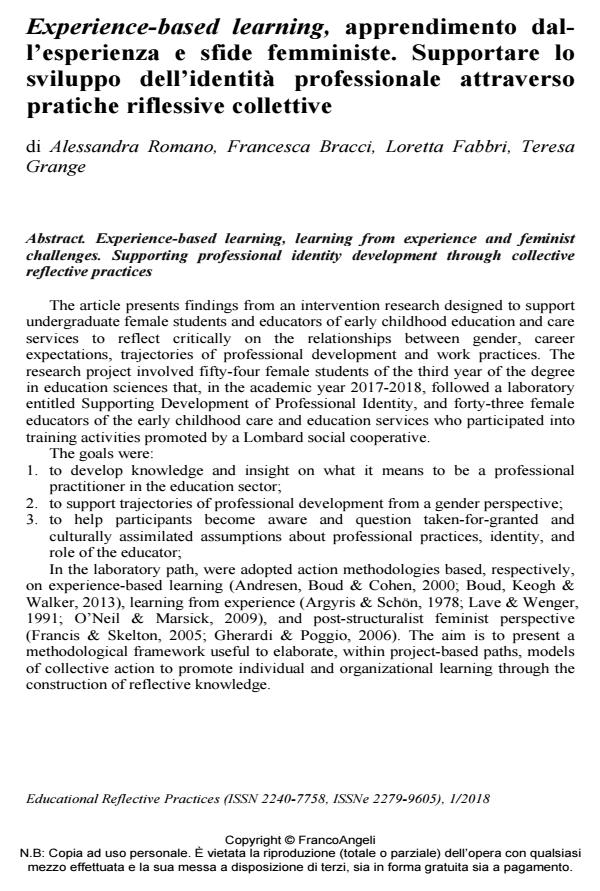Experience-based learning, apprendimento dall’esperienza e sfide femministe. Supportare lo sviluppo dell’identità professionale attraverso pratiche riflessive collettive
Titolo Rivista EDUCATIONAL REFLECTIVE PRACTICES
Autori/Curatori Alessandra Romano, Francesca Bracci, Loretta Fabbri, Teresa Grange
Anno di pubblicazione 2018 Fascicolo 2018/1
Lingua Italiano Numero pagine 16 P. 9-24 Dimensione file 212 KB
DOI 10.3280/ERP2018-001002
Il DOI è il codice a barre della proprietà intellettuale: per saperne di più
clicca qui
Qui sotto puoi vedere in anteprima la prima pagina di questo articolo.
Se questo articolo ti interessa, lo puoi acquistare (e scaricare in formato pdf) seguendo le facili indicazioni per acquistare il download credit. Acquista Download Credits per scaricare questo Articolo in formato PDF

FrancoAngeli è membro della Publishers International Linking Association, Inc (PILA)associazione indipendente e non profit per facilitare (attraverso i servizi tecnologici implementati da CrossRef.org) l’accesso degli studiosi ai contenuti digitali nelle pubblicazioni professionali e scientifiche
The article presents findings from an intervention research designed to support undergraduate female students and educators of early childhood education and care services to reflect critically on the relationships between gender, career expectations, trajectories of professional development and work practices. The research project involved fifty-four female students of the third year of the degree in education sciences that, in the academic year 2017-2018, followed a laboratory entitled Supporting Development of Professional Identity, and forty-three female educators of the early childhood care and education services who participated into training activities promoted by a Lombard social cooperative. The goals were: 1. to develop knowledge and insight on what it means to be a professional practitioner in the education sector; 2. to support trajectories of professional development from a gender perspective; 3. to help participants become aware and question taken-for-granted and culturally assimilated assumptions about professional practices, identity, and role of the educator; In the laboratory path, were adopted action methodologies based, respectively, on experience-based learning (Andresen, Boud & Cohen, 2000; Boud, Keogh & Walker, 2013), learning from experience (Argyris & Schön, 1978; Lave & Wenger, 1991; O’Neil & Marsick, 2009), and post-structuralist feminist perspective (Francis & Skelton, 2005; Gherardi & Poggio, 2006). The aim is to present a methodological framework useful to elaborate, within project-based paths, models of collective action to promote individual and organizational learning through the construction of reflective knowledge.
- Collaborative practices for inclusive perspectives and beliefs in preservice teachers. The case of the training course for teachers for special needs students Alessandra Romano, in EDUCATIONAL REFLECTIVE PRACTICES 2/2020 pp.19
DOI: 10.3280/ERP2019-002002 - Tradurre l'orientamento in pratica: laboratori per lo sviluppo delle prefigurazioni professionali degli studenti e delle studentesse Francesca Bianchi, Nicolina Bosco, Caterina Garofano, Alessandra Romano, in EDUCATIONAL REFLECTIVE PRACTICES 2/2021 pp.5
DOI: 10.3280/erp2-2021oa12112
Alessandra Romano, Francesca Bracci, Loretta Fabbri, Teresa Grange, Experience-based learning, apprendimento dall’esperienza e sfide femministe. Supportare lo sviluppo dell’identità professionale attraverso pratiche riflessive collettive in "EDUCATIONAL REFLECTIVE PRACTICES" 1/2018, pp 9-24, DOI: 10.3280/ERP2018-001002